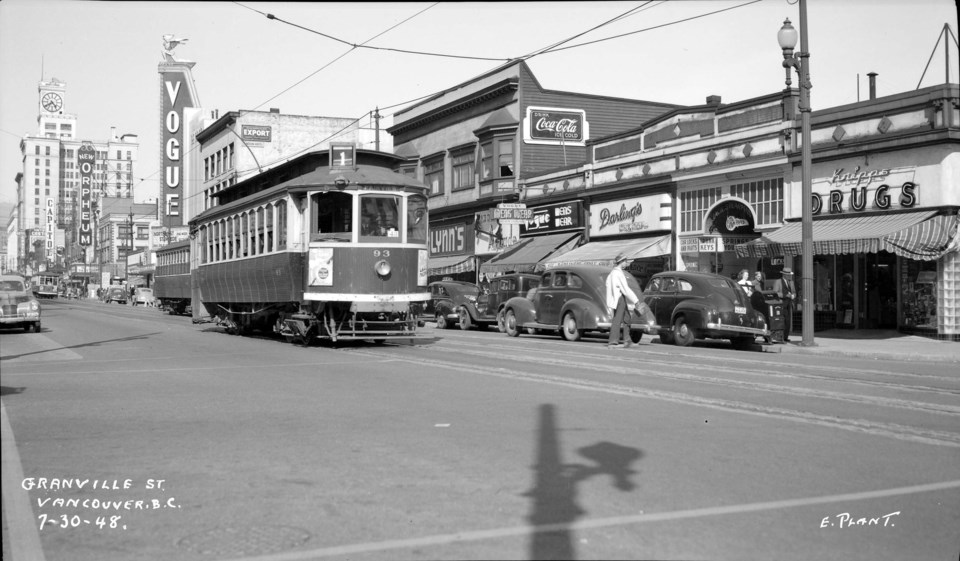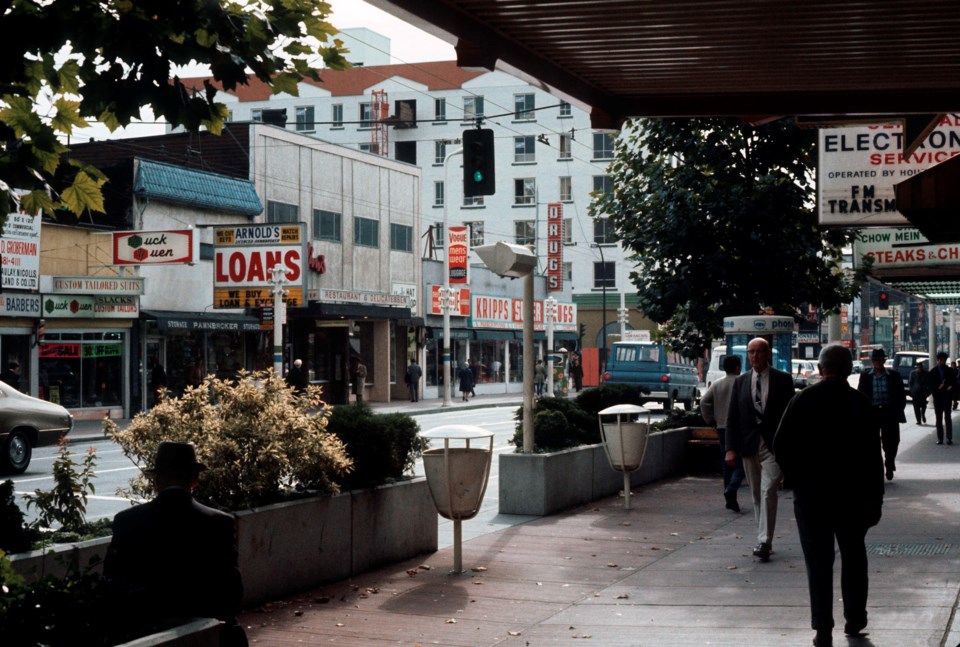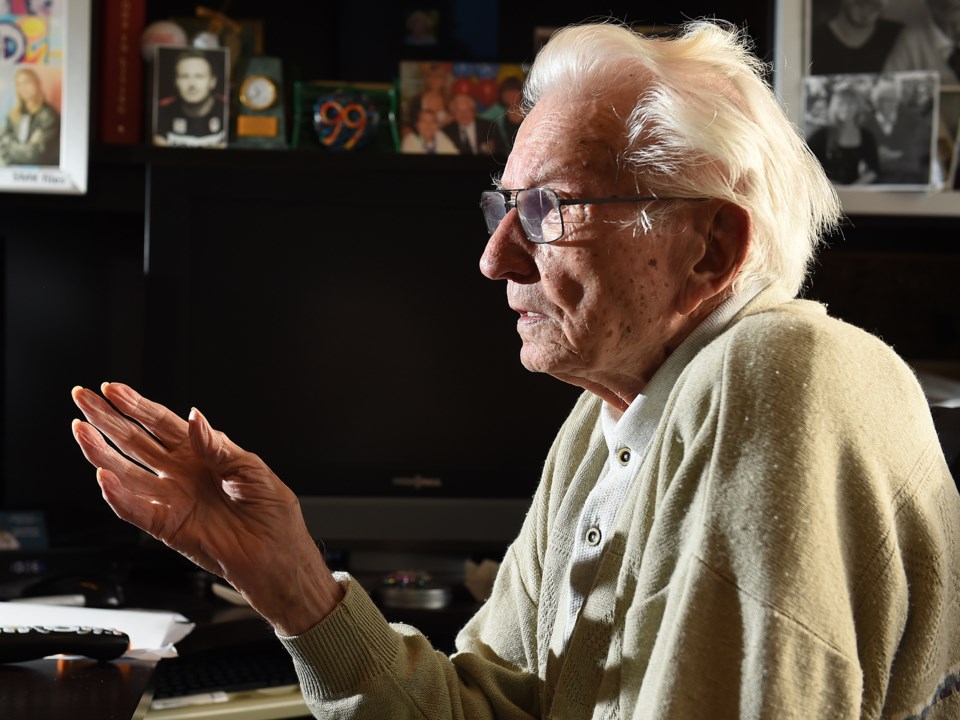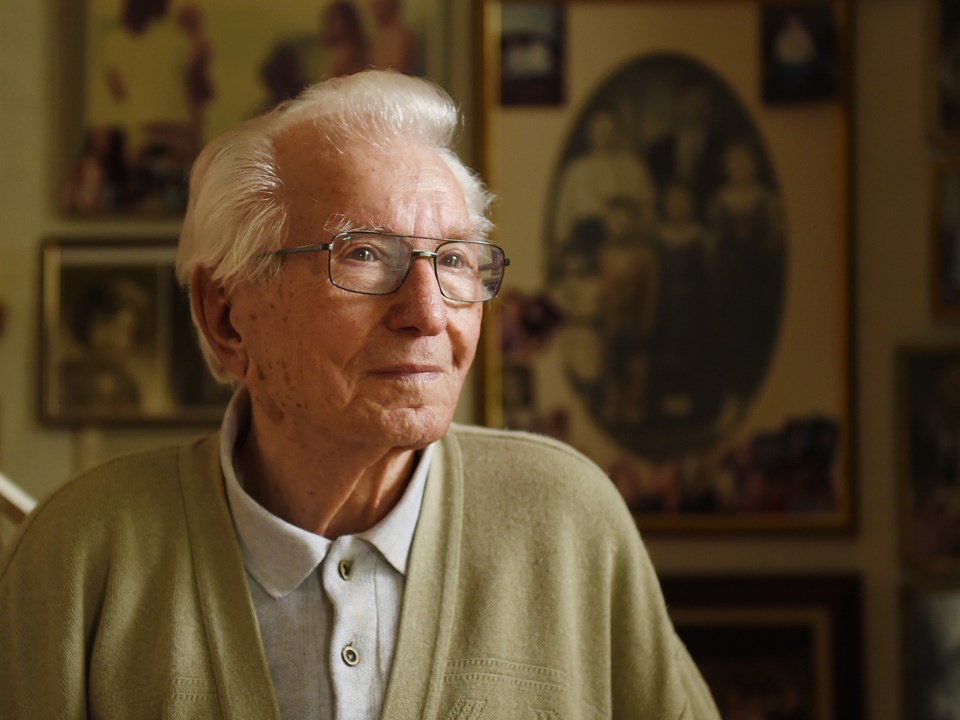It would be easy for Stephen Kripps to look back.
Just days shy of his 100th birthday, the Oakridge resident has yarns aplenty: his Second World War service, being the first vitamin supplement supplier in Vancouver, rubbing shoulders with B.C.’s longest-serving premier, W.A.C. Bennett.
Not so fast.
Kripps wants to talk about what his next 100 years on the planet will look like.
“I think the second centennial will be a lot easier, because you don’t have to go to school anymore, you don’t have to learn how to tie your shoelaces, you don’t have to memorize so many things,” Kripps told the Courier.
The Kripps family entered �鶹��ýӳ��lore in 1947, with the opening of Kripps Pharmacy on Granville and Nelson streets.
The pharmacy’s classic “Drugs” neon sign was a fixture at that intersection for decades.
Seventy-plus year later, the business continues in Kerrisdale after moving out of downtown in 2007.
Kripps passes the century mark on Jan. 19.
Only last month did he finally decide to retire.
“You don’t have to go to work anymore,” Kripps said. “You just keep sailing.”

Kripps was born in Hampton, Sask. to immigrant parents from Ukraine. He was a year into his studies in pharmacy when drafted into military service.
He served as a lab tech on a hospital ship off the U.K. coast, bringing some of the most severely wounded troops back to Canada.
Kripps estimates he made around 20 cross-Atlantic trips during his service, which began at the age of 21.
He had to grow up fast.
“We went to Ottawa for advanced training before leaving,” Kripps recalled. “The sergeant major from the First World War called us all out onto a field and said, ‘Tomorrow I’m going to make soldiers out of you.’ It was a 20-mile route march with full pack, which was 70 pounds and we’re not even broken in yet. Of course, I thought, ‘I’m a Prairie guy, I’m tough, I’m going to make it back.’ And I did.”
Kripps made it back to Canada in 1945 and married his sweetheart Agnes in June 1946. Agnes would go on to serve as a Social Credit MLA for �鶹��ýӳ��South from 1969 to 1972 and was instrumental in the establishment of the B.C. Day holiday in the early 1970s.
�鶹��ýӳ��came calling in 1947 and Kripps found himself working at the Owl Drug Store pharmacy, where he caught wind the owner might want to sell. A quick conversation and handshake later and Kripps Pharmacy was born.
He paid $14,000 for the business while living at an East �鶹��ýӳ��rooming house. Rent was $30 a month.
The original family home, which Kripps still lives in today, was bought six decades ago for $60,000. Its assessed value is now well into the seven figures.
“Granville Street was just a little outskirt back then,” Kripps said. “There was nothing around.”
Kripps’s training as both a lab tech and pharmacist was his ace in the hole, and he developed vitamin supplements long before the gym bro health craze made #gainz an annoying hashtag on social media.
He coasted into semi-retirement in 1977, handing the business over to his daughter and son-in-law. Kripps continued working Saturdays up until the onset of 2020.
“I needed time to golf,” Kripps quipped.
Kripps kept researching, reading and expanding his knowledge base well into his golden years. His biggest hope for the next century is to erase refined sugar from everyone’s diets.

He’d stand on rooftops if he could to make it so, going so far as telling the Courier team who visited him that they had together entered into a pact to make refined sugar yesterday’s news.
“Refined sugar, this is the biggest problem facing humanity,” Kripps maintains.
Kripps ditched refined sugar 40 years ago and felt no withdrawals within three to four weeks.
So is that to suggest there will be no cake on his big day come next week?
“I’ll cheat for cake,” Kripps responds.
A century of wisdom
The Courier picked Kripps’s brain for nuggets of truth from someone who has seen 99.9 trips around the sun.
How did your service in the Second World War shape the person you became?
I was pretty hardened. We brought in a doctor whose hospital was bombed overseas. He got what we called shellshock back in those days and we brought him in a padded cell to Montreal. I delivered him to the hospital and the wife and daughter came to see him. He did not know his wife or daughter. If that doesn’t hit the heart, nothing will.
How did you cope with the things you saw and experienced once you got home to Canada?
You just go at it … you just go at it.
What were the most common ailments you saw when you first entered the pharmacy profession?
Coughs, colds, injuries, skin infections. A lot of the same things you see today. People will always hurt themselves.

You’re healthy at almost 100, what do you attribute that to?
Kripps motions towards a business card that reads:
“Genes (no control over this); good digestion (no liquids with food); no refined sugar; take Kripps supplements and I love my work [and] helping others.”
You have a cannabis plant growing in your window. Please explain.
I’m just growing it to see what happens with it. I don’t use it, but it’s an interesting plant. Marijuana is medicine. It’s been here for thousands of years. There are less side effects than some of the more powerful drugs.
What are the biggest changes in the 70 years you’ve been in the medical field?
A tincture of iodine was in every house in 1947. It went out of favour after a while. Antibiotics was a big thing that started towards the end of the war. And then vaccinations came, another huge thing.
You have four children who have all excelled in their careers (lawyer, librarian, nutritionist and retired teacher). How do you explain their success?
I’m Ukrainian. When the parents came here, education was the key. Education was pounded in our heads. Mom and Dad continuously told us we needed an education.
What kind of qualities do you look for in a friend?
It’s automatic — you take to people or you don’t. You’re my friend.
How do you deal with regret?
You quickly forget about it. Never carry a grudge.
How do you get over the hump if you’re having a bad day?
I don’t usually have a bad day. I don’t know how to explain that. I guess I’m an eternal optimist. Both my dad and mom were that way.
@JohnKurucz



